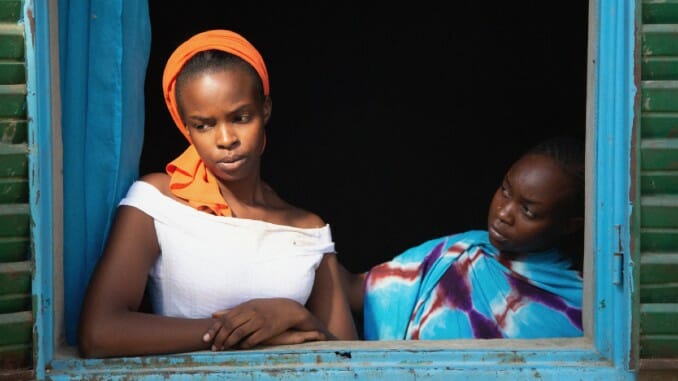Lingui, the Sacred Bonds Weaves a Web of Feminine Kinship

The Chadian word “lingui” denotes the invisible social ties that sustain communities of people, especially if they’re connected by a common unifying trait. In Mahamat-Saleh Haroun’s film Lingui, the Sacred Bonds, this alliance is forged through the strife and solidarity intrinsic to womanhood. Though much of the Chadian-born, France-residing director’s work has focused on the lives of outsiders and underdogs, Lingui is his most feminine-forward film to date—perhaps save for his acclaimed 1994 breakthrough short film Maral Tanié, which chronicles a teenage girl forced by her family to marry a man in his 50s, a union which she refuses to consummate. Similarly in Lingui, a teenage girl named Maria (Rihane Khalil Alio) finds herself maligned by patriarchal society when she discovers she’s pregnant with a child she has no intention of raising. Fortunately, her single mother Amina (Achouackh Abakar Souleymane) understands what it feels like to be shunned for carrying a child out of wedlock, and begins a quest with Maria to secure an abortion—despite the legal and societal ramifications that threaten them if their plot is exposed.
Taking place on the periphery of the Chadian capital of N’Djamena, the material circumstances of Maria’s life are immediately altered once word of her pregnancy gets out. She is dismissed from school due to officials fearing that their institution’s reputation would be tarnished if they allowed her to continue enrolling while pregnant. The imam of their local mosque begins lingering around their household, demanding that the two women show up for prayer more regularly. Maria’s peers begin to probe into the details of her personal life, insinuating disapproval toward the rumor of her pregnancy. Even Amina is hysterical when she first hears the news, going so far as to come to blows with her daughter when she first expresses her intention to have an abortion (particularly due to their religion). Though these initial condemnatory attitudes toward Maria’s pregnancy are devastating to the 15-year-old, Amina almost instantly comes around to support her daughter after they share a frank conversation.
“I don’t want to be like you, mom,” says Maria. “Everyone thinks you’re a loose woman. No one respects you. I don’t want that life.” Though this remark seems disparaging, it’s merely a reflection of the very real sentiments harbored toward unmarried mothers in Chadian society. Amina was banished by her family due to her own pregnancy at age 15, and with her daughter’s struggles reflecting those of her own, she becomes determined to work any and all connections she has to ensure her daughter’s life isn’t negatively affected by the same social stigmas she’s suffered from.
However, Lingui, the Sacred Bonds never utilizes feminine trauma, pain and marginalization in a way that feels exploitative. In fact, there is little desire on Haroun’s part to linger on bleak platitudes for the sake of making his point on the fraught reality of womanhood. The film is instead singularly focused on the various—and often discreet—ways that women rebel against the status quo. The silent and subdued nature of such actions are simply a way of preserving these illicit channels which preserve some semblance of female independence. This is particularly true of the women who perform clandestine abortions in their own homes, though it’s also made clear that the precarious nature of these procedures is but another disquieting risk when asserting female bodily autonomy.
-

-

-

-

-

-

-

-

-

-

-

-

-

-

-

-

-

-

-

-

-

-

-

-

-

-

-

-

-

-

-

-

-

-

-

-

-

-

-

-








































